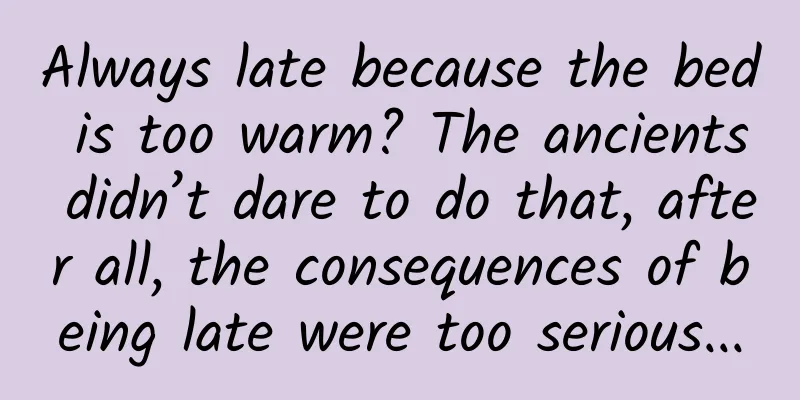Always late because the bed is too warm? The ancients didn’t dare to do that, after all, the consequences of being late were too serious...

|
The weather is getting colder There are more reasons why workers are late Compared with the busy and stressful life of modern people Everyone can't help but envy the "office workers" in ancient times They seem to just enjoy the flowers and drink tea every day Never worry about clocking in for work … However, this is just a scene in a costume drama In fact, they not only have to punch in but also work the night shift. You may even face jail time for being late. In this issue, we will take you to understand The bitter experiences of the ancients at work 01 Getting up earlier than the chickens to go to work Peach Blossom and Two Chickens, Qing Dynasty Image source: Shanghai Museum The word "go to work" originated from the ancients going to court. "Ban" originally meant to arrange, and later became a measure of queues. Officials went to court in different queues, divided into civil and military classes, and the word "go to work" was derived from this. In the Ming and Qing dynasties, going to work mostly referred to working in government offices. For example, in the Qing Dynasty's long fantasy novel "The Complete Biography of Jigong", there is a saying "Yesterday I went to work in the government office." The earliest description of officials going to work in ancient times appeared in the Book of Songs. In the Book of Songs, there are such lines: "When the cock crows, the morning is full" and "When the east is bright, the morning is prosperous", which means that when the cock crows, the officials are ready to go to court; when the east is bright, the officials have already filled the court. This poem describes the scene of officials of Qi State attending the morning court in the Spring and Autumn Period. It can be seen that in the Spring and Autumn Period, people had to go to work when the cockcrowed. The cockcrow time is generally from 5 to 7 in the morning, which is also called the Mao time. The "roll call" of officials to work starts at about 5 o'clock and lasts for a long time. Therefore, the ancient roll call was called "Dianmao", which was a method of attendance for officials in the old days. TIPS: In ancient times, a day and night was divided into 12 hours, each hour was equivalent to two hours now, and was represented by 12 earthly branches, namely Zi, Chou, Yin, Mao, Chen, Si, Wu, Weiming, Shen, You, Cheng, and Hai. In the Tang Dynasty, "official street drums" were set up in the streets and alleys of Chang'an City. At 5:00 a.m., the drums sounded and the gates of the alleys, which were the gates of the streets in ancient times, were opened. When officials living in the capital heard the drums, they knew it was time to go to court. In fact, the official street drums placed in the streets were mainly used to tell time and warn against thieves, and had nothing to do with officials going to court. However, officials could judge the time according to the drum sounds to remind themselves not to miss the court. The "official street drum" was struck at "five o'clock in the morning", which was about the time of the morning when officials went to court. In the "Miscellaneous Records of Emperor Minghuang", a collection of ancient Chinese historical materials compiled by Zheng Chuhui in the Tang Dynasty, there is a record: "When the fifth drum sounded, the door was full of fire, and the officials were about to go to court, and the carriages were as big as the market", which vividly depicted the scene of officials going to court at the fifth drum. In the Ming Dynasty, officials had to work harder. Not only did they have to get up early, but they also had to enter the palace in the dark. According to the Qing Dynasty miscellany "Tianzhi Ouwen", there were street lights in the Forbidden City in the Ming Dynasty. During the Tianqi period, the eunuch Wei Zhongxian was in power and ordered the street lights to be removed to facilitate entering and leaving the palace gates late at night. Therefore, officials had to walk in the dark to attend court in the early morning. Because there was no lighting in the palace, there was an accident in the Ming Dynasty where an official rushed to work in the dark when it rained and fell into the Imperial River due to the slippery road and drowned. The Qing Dynasty inherited this rule from the Ming Dynasty. In order to prevent fire hazards, no lights were allowed in the Forbidden City at night, so officials of the Qing Dynasty still "went to court at night, all walked in secretly, and could not be identified unless they were carefully examined." In addition to officials and runners, slaves and craftsmen in ancient times also had to go to work. Their working hours may be longer than those of ordinary officials. In his article "Lament for Maid Yin", Fang Bao, a Qing Dynasty Confucian scholar, recalled a maid named "Yin" and said that she "went to bed at four o'clock in the night and got up at the crowing of the cock, which was her usual habit", that is, she went to bed at one or two o'clock in the middle of the night and got up at six o'clock in the morning to work, all year round. Except for sleeping time, she worked all day, without holidays, until the end of her life... Fang Bao's maid died at the age of 17 due to excessive work. 02 Sleeping later than a dog on the night shift Ming Dynasty Fan Page: Emperor Minghuang Visits the Moon Palace Image source: The Palace Museum The Tang Dynasty began to have a system of ministers working night shifts, stipulating that the heads of the three ministries of Zhongshu, Shangshu, and Menxia should take turns to work night shifts. Each province had a "zhibo" (night shift record book), which was handed over to the person on night shift by the Zhilingshi on the same day and collected the next day. Yao Chong, a famous prime minister in the Tang Dynasty, served in the three dynasties of Empress Wu, Emperor Ruizong, and Emperor Xuanzong, and was highly respected. During the reign of Emperor Xuanzong, Yao Chong was old and unwilling to work the night shift, so the direct clerk skipped Yao Chong and passed the "direct book" down, which caused dissatisfaction among other ministers, who thought Yao Chong was seeking special treatment. The direct clerk was very embarrassed and had to send the duty book to Yao Chong again. Yao Chong wrote on the duty book: "Tell the direct clerk that he was sent away and came back again, and he must take someone, which is the same as the fate. The old man is old and is not suitable for it." Yao Chong said that he was so old, and he was still asked to work the night shift. Isn't it too unreasonable? After reading Yao Chong's comments, the other ministers didn't know what to say. Although working the night shift was hard, it also changed the fate of some people. According to the "Records of Four Dynasties" written by the Southern Song poet Ye Shaoweng, during the reign of Emperor Xiaozong of the Southern Song Dynasty, Minister Zhou Bida was on night shift once, and Emperor Xiaozong asked him to chat. This chat made Emperor Xiaozong very happy, so he gave him a seat and invited him to drink. The next day, Emperor Xiaozong promoted Zhou Bida's official position and appointed him as the Minister of State Affairs. Of course, there are also those who can only study but not chat. The poet Du Fu also worked night shifts when he was an official. He wrote poems to pass the time when he was on night shift. The poem "Spring Stay in Zuo Sheng" was written when he was on night shift. The Zuo Sheng here is the Menxia Sheng to which Zuo Shiyi (Zuo Shiyi is the title of an ancient official position, whose main function is to deal with the emperor's policy decision-making mistakes and is affiliated with the Jianzheng agency.) is a central government agency that handles confidential matters, just like Zhongshu Sheng. Because it is located to the east of the palace, it is called "Zuo Sheng". Chunsu Zuo Sheng Flowers hide behind the walls at dusk, and birds chirp as they fly by. The stars are shining over every house, and the moon is high in the sky. I can't sleep listening to the golden key, and I think of the jade bell because of the wind. There will be a secret document tomorrow morning, asking several times about how the night went. 03 A strict hierarchy of transportation to work A pair of Tang Dynasty sancai figurines of officials Image source: Shaanxi Tang Sancai Art Museum The civil and military official system began in the Spring and Autumn Period and the Warring States Period, and each performed their duties in the following years. In the Tang Dynasty, there were obvious differences in the clothing and hair crowns of civil and military officials. In this group of official figurines, the civil officials wear Jinxian crowns, and the military officials wear He crowns, wearing yellow court robes, standing on a high platform. The civil officials have handsome faces, their eyelids slightly open, and serious expressions, as if thinking about something, bowing and holding a tablet; the military officials look back sideways, as if looking at their colleagues, and hold a sword, but the tablets and swords in the hands of the civil and military officials are missing. Modern office workers usually use buses and subways as their means of transportation. Some drive private cars, while others carpool. The specific mode of transportation is entirely up to the individual according to the situation. However, in ancient times, officials could not decide the means of transportation they used to go to work. Instead, it was determined by the rank of their official rank and whether they were civil or military officials. In ancient times, officials first rode ox carts to work, then horse-drawn carriages, and later sedan chairs. However, not every official was qualified to ride in a carriage or sedan chair. There were strict regulations based on the rank of the official. Even the decoration of the carriage had different grades. For example, in the Han Dynasty, the level of the official rank was indicated by the vermilion-painted screens on the left and right sides of the carriage. Those with a salary of more than 600 stones could paint the left reins vermilion; those with a salary of more than 2,000 stones could paint both the left and right reins vermilion. Ordinary officials could only use blue cloth for the roof cover, and officials with a salary of more than 1,000 stones could use silk. During the Tang and Song dynasties, officials were encouraged to ride horses to work, just like riding bicycles or electric bikes to work today. Those who rode sedan chairs to work were generally high-ranking civil officials or elderly officials who were frail and sick, while military officials generally rode horses, so there was a saying that "civil officials rode sedan chairs, and military officials rode horses." Horse hitching post Image source: Chengcheng Media A hitching post is a post used to tie a horse, also called a "horse hitching stone", "lookout post", "sample post", etc. It is used by military officers when riding horses to work, and it is also very popular among the people. 04 Being late for work will cost you money, a beating, and even jail time. Tang Fish Talisman Image source: CCTV News The fish token system first appeared in the Sui Dynasty, and continued to develop, improve, and popularize in the Tang Dynasty. It continued to be used until the Khitan people established the Liao Dynasty. Tang Dynasty officials needed to use fish tokens to verify their identities when performing official duties or entering and leaving the palace. The left token was placed with the emperor, and the right token was carried by the official himself. The material of the fish token was different for different officials of different ranks - princes and officials above the third rank used gold fish tokens, officials below the third rank and above the fifth rank used silver fish tokens, and officials of the sixth rank and below used copper fish tokens. The fish tokens were engraved with detailed identity information, including the official's name, department, and official rank. The ancients had a very strict attendance system. Any minister who was absent without reason, late, or misbehaved at court would be considered a violation of discipline and would be severely punished. The Tang Dynasty had more detailed regulations for the attendance system. The most common means of dealing with unexcused absences was to deduct money, and the deduction was extremely harsh. According to Tang Huiyao, "civil and military officials who fail to attend court without reason will be deducted one quarter of their salary." This means that during the reign of Emperor Xuanzong of Tang, one quarter of the salary would be deducted for one day of absence, which means that if one was absent four times, the entire year's work would be in vain. During the reign of Emperor Suzong of Tang, this standard was reduced to one month, but it was still enough to make workers heartbroken. There is also a more severe punishment for absenteeism, which is caning. There is such a provision in "Tang Law Commentary": "Any official who fails to go to work without reason or is not on duty, if he violates the rules because of his free time, shall be caned twenty times a day, and one level more for three days; if he exceeds the limit, he shall be caned one hundred times, and one level more for ten days; the crime shall not exceed one and a half years in prison. For important officials at the border, the penalty shall be increased by one level." Any official who is absent from work without reason shall be caned twenty times for each day of absence, and one level more for each additional three days; if he exceeds the limit, he shall be caned one hundred times, and one year in prison if he exceeds the limit. The people of the Song Dynasty also had very early working hours. According to the Song Dynasty note book "Pingzhou Ke Tan", officials went to court at the fourth watch, when it was still dark and candles were needed for lighting. In order to avoid being lazy, some officials claimed to be sick and did not attend court meetings. This situation became more and more serious until the reign of Emperor Renzong of Song, when an imperial censor impeached 33 people including Shi Zhongli, the editor of the History Museum, for being absent from work under the pretext of being sick. This made Emperor Renzong of Song very angry, and he issued an imperial edict to warn all officials. In order to plug the loophole of "sick leave", Emperor Renzong of Song stipulated that if someone repeatedly claimed to be sick and did not attend court meetings, the court would send a medical officer to check and verify, and if someone was found to be "cheating", he would be severely punished. In order to verify whether officials come to work on time, the Yuan Dynasty also had corresponding regulations. According to "Yuan Dianzhang·Libu 7·Gonggui 1", "Officials in the capital, prefectures, and counties gather in a circle every morning to discuss lawsuits and handle official business. They are not allowed to neglect their duties except for holidays. They still have to sign official documents once a day. If they are away on official business, they must attach a mark above." That is, those who go out on official business also need to make a note on the sign-in sheet for easy verification. According to the "History of Yuan Dynasty: Biography of Zhao Mengfu", the great painter Zhao Mengfu was beaten with a stick for being late for court when he was a military officer in the Shangshu Province. At that time, Prime Minister Sangge was very strict about attendance and stipulated that people must go to work on time. Those who were late would be beaten with a stick, and the law would be enforced by the judge. One day, Zhao Mengfu was late for work, and was dragged to the judge by the ruthless judge and beaten with a stick. Zhao Mengfu felt very embarrassed and went to complain to the prime minister. Prime Minister Sangge also felt that this was inappropriate, and later changed it to only beating low-level officials for being late or absent, while senior officials could be exempted, so-called "no punishment for doctors." In the early Qing Dynasty, attendance management was quite strict. Not only did they have to clock in when they came on duty, but they also had to sign out when they left. The emperor sent eunuchs to supervise the gates and record the attendance of officials in the capital every day. If an official had to leave early because of business to be handled by the ministry or a special event, he had to inform the eunuchs of the reason for leaving early and keep a record for future review. After unveiling the mystery of how the ancients went to work What we see is still the hard commuting Stressful and busy work routine It seems that no matter ancient or modern, everyone should Relax and treat yourself Well, see you next time~ END Sources: National History of China, Shanghai Museum, Palace Museum, Shaanxi Tang Sancai Art Museum, CCTV News, "Han Law", "Ancient and Modern Things", Phoenix Online Reading, "Guoyu·Luyu" by Zuo Qiuming in the Spring and Autumn Period, "Lushi" by Luo Mi in the Song Dynasty, "The Book of Songs·Guofeng", "Ancient and Modern Notes·Questions and Answers" by Cui Bao in the Jin Dynasty, "Tang Huiyao" by Wang Pu in the Song Dynasty, "Tang Law Commentary" by Zhangsun Wuji and others in the Tang Dynasty, "Pingzhou Ketan" and "Yuan Dianzhang" by Zhu Yu in the Song Dynasty, "Yuanshi" by Song Lian in the Ming Dynasty, "Tianzhi Ouwen" by Zhenjun in the Qing Dynasty, Museums|See the Exhibition Image sources: Shanghai Museum, Palace Museum, Shaanxi Tang Sancai Art Museum, CCTV News Cover image source: Qing Dynasty "Purple Light Pavilion Banquet Picture" scroll Palace Museum, Chengcheng Media Source: Chongqing Jiulongpo District Cultural Relics Management Office Audit expert: Li Xiaoying Statement: Except for original content and special notes, some pictures are from the Internet. They are not for commercial purposes and are only used as popular science materials. The copyright belongs to the original authors. If there is any infringement, please contact us to delete them. |
<<: This natural secret is called "the original appearance of the world"
Recommend
How to visit Siheyuan? This guide will give you the answer →
Beijingers affectionately call it Siheyuan It is ...
Who are the people who spend 10,000 yuan to buy an iPhone 11? Are you one of them?
When the iPhone 11 was launched, it was criticize...
It can actually lead to intracranial infection. Does picking your nose really mean it’s dangerous?
Audit expert: Yuan Xiandao Deputy Chief Physician...
Webb is going to doubt his mission again? The twists and turns before the space telescope is launched
Spitzer Telescope 10th anniversary photo. Copyrig...
Did volcanic eruptions cause the fifth mass extinction?
The fifth mass extinction event, which occurred a...
The last beta version of iOS 15 is released, and bugs and vulnerabilities will continue to be fixed. The official version will be coming soon
Old iPhone 13 users are more discussing whether i...
Long-term formal sideline project, fool-proof operation, daily income of 300+ [paid article]
Long-term formal sideline project, fool-proof ope...
SAIC Volkswagen Teramont debuts
At this year's Guangzhou Auto Show, SAIC Volk...
Why does it rain heavily during the Qingming Festival?
Du Mu is the busiest during the Qingming Festival...
Ministry of Industry and Information Technology: By 2024, my country's 5G mobile phone shipments will account for more than 85%
In order to implement the spirit of the 20th Nati...
Monetization methods and profit models of social products
There is a widely circulated formula in the Inter...
Super complete! All the advertising strategies for 2018 are here!
According to the data from the "2018 China O...
After launching a satellite, the rocket will only become space junk? Maybe it can also protect the earth!
On November 5, the Long March 6 carrier rocket su...
12 essential creative ways to plan events, don’t say you don’t know them yet!
The Spring Festival, Valentine's Day, Lantern...
How to acquire seed users without money or resources?
When a new product is just starting to operate, I...









